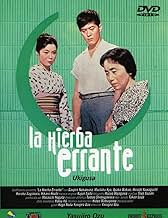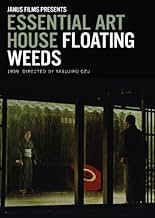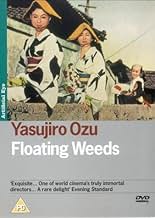IMDb RATING
7.9/10
9.5K
YOUR RATING
The head of a Japanese theatre troupe returns to a small coastal town where he left a son who thinks he is his uncle, and tries to make up for the lost time, but his current mistress grows j... Read allThe head of a Japanese theatre troupe returns to a small coastal town where he left a son who thinks he is his uncle, and tries to make up for the lost time, but his current mistress grows jealous.The head of a Japanese theatre troupe returns to a small coastal town where he left a son who thinks he is his uncle, and tries to make up for the lost time, but his current mistress grows jealous.
- Director
- Writers
- Stars
- Director
- Writers
- All cast & crew
- Production, box office & more at IMDbPro
Featured reviews
Komajuro Arashi and his acting troupe arrive in a small fishing village on the coast of Japan. Komanjuro goes to visit a woman who runs a sake bar, and who, we learn, is a former lover, and with whom he fathered a child, though the child is unaware of this fact and believes him to be his uncle
Their son, Kiyoshi, has just finished high school, and Komanju comes to see him as much as his former lover. He hopes that Kiyoshi will be able to become something in his life and not end up like Komanju himself, a washed-up actor drawing small crowds for his failing samurai productions.
When Komajuro talks with his gorgeous young son, we can see the excitement in his eyes, in his face. The acting here is all rather flat, or better, it's reserved. (Ozu adds a little joke to this later in the film, when on a fishing boat Kiyoshi accuses his father of being "too muggy" in his performance.) This adds to the impact of the few emotional (and physical) outbursts later in the film.
The conflict in the film is that of Komajuro's double lives. When his current mistress, Miss Sumiko -- a jealous and conniving witch of a woman -- discovers that he's been seeing some other woman, she's enraged, and plots what she believes will be his sort of downfall. By hiring a young woman, Kayo, to seduce Kiyoshi and embarrass Komajuro, she plans on making the two seem like different generations of the same person, both relating with unimportant actresses, thereby ruining Komajuro's hopes of his son becoming somebody important.
Unlike most, Ozu is an auteur because of what he doesn't do. His unmoving camera, which is famous, sits placidly, observing the characters with interest. I do sometimes wish that the camera would move around curiously, interested in the conversations of the characters, but maybe Ozu's point was that his camera is (or we should be) too interested to move, and that the events of everyday life need not be jazzed up for entertainment purposes. (He seems to mock this idea when he has Komajuro say to Kiyoshi about his plays that, basically, modern audiences can't appreciate good drama.) The entire film is restrained; on the rare occasion when people cry, they cover their faces and softly whimper.
The ending shot of a dark blue sky, with red lights from a rolling train, reminds us that whether it's 2003 in North America or 1959 in a small Japanese fishing village, we're all the same people with the same problems.
In and of itself, the film is terrifically simple: a simple story, with simple acting, simple music, and made even more simple by the simplicity of the static camera. But what makes the film something special, rather than just some family drama, is the honesty. Ozu isn't after anything big here. Any enlightenment comes from Ozu's realization that the most important conflicts are in the home, the ones no one sees, the ones we all feel.
****
Their son, Kiyoshi, has just finished high school, and Komanju comes to see him as much as his former lover. He hopes that Kiyoshi will be able to become something in his life and not end up like Komanju himself, a washed-up actor drawing small crowds for his failing samurai productions.
When Komajuro talks with his gorgeous young son, we can see the excitement in his eyes, in his face. The acting here is all rather flat, or better, it's reserved. (Ozu adds a little joke to this later in the film, when on a fishing boat Kiyoshi accuses his father of being "too muggy" in his performance.) This adds to the impact of the few emotional (and physical) outbursts later in the film.
The conflict in the film is that of Komajuro's double lives. When his current mistress, Miss Sumiko -- a jealous and conniving witch of a woman -- discovers that he's been seeing some other woman, she's enraged, and plots what she believes will be his sort of downfall. By hiring a young woman, Kayo, to seduce Kiyoshi and embarrass Komajuro, she plans on making the two seem like different generations of the same person, both relating with unimportant actresses, thereby ruining Komajuro's hopes of his son becoming somebody important.
Unlike most, Ozu is an auteur because of what he doesn't do. His unmoving camera, which is famous, sits placidly, observing the characters with interest. I do sometimes wish that the camera would move around curiously, interested in the conversations of the characters, but maybe Ozu's point was that his camera is (or we should be) too interested to move, and that the events of everyday life need not be jazzed up for entertainment purposes. (He seems to mock this idea when he has Komajuro say to Kiyoshi about his plays that, basically, modern audiences can't appreciate good drama.) The entire film is restrained; on the rare occasion when people cry, they cover their faces and softly whimper.
The ending shot of a dark blue sky, with red lights from a rolling train, reminds us that whether it's 2003 in North America or 1959 in a small Japanese fishing village, we're all the same people with the same problems.
In and of itself, the film is terrifically simple: a simple story, with simple acting, simple music, and made even more simple by the simplicity of the static camera. But what makes the film something special, rather than just some family drama, is the honesty. Ozu isn't after anything big here. Any enlightenment comes from Ozu's realization that the most important conflicts are in the home, the ones no one sees, the ones we all feel.
****
This close remake of Yashijuro Ozu's silent 'The Story of Floating Weeds' from 1934 which was made under the aegis of Shochiku studios is a far mellower work which reflects not only its director's maturity but also the cheerier tone preferred by Daiei. He also has the benefit here of utilising Daiei's senior lighting cameraman Kazuo Miyagawa whose colour cinematography is ravishing as well as two of Daiei's leading performers Ganjiro Nakayama and Machiko Kyo as master and mistress Komajuro and Sumiko. The sunnier treatment is heightened by the wistful, nostalgic score by Fakandu Saito which would not be out of place in a Jacques Tati film.
Taking its title from the Japanese name for itinerant actors, this has all the hallmarks of Ozu's oeuvre, in terms of serenity, humanism and a profound understanding of the human heart. As usual the camera is static and placed a little below the actors whilst the compositions are nothing less than painterly. For this viewer at any rate one would have wished a few scenes, notably the confrontation between Komajuro, Oyoshi, Kyoshi and Kayo, to have been a little more animated but that is simply not Ozu's way. The argument between Komajuro and Sumiko whilst sheltering from the rain is masterfully handled as is their final touching scene in the railway station. The splendid images that open and close the film linger long in the memory.
By all accounts Ozu never aimed for an international audience and indeed his films were not really appreciated in the West until the decade after his death. His work is very much one of variations on a theme and as avowed Ozu devoteee Roger Ebert has observed: "To look at any of his films is to glimpse the whole."
Taking its title from the Japanese name for itinerant actors, this has all the hallmarks of Ozu's oeuvre, in terms of serenity, humanism and a profound understanding of the human heart. As usual the camera is static and placed a little below the actors whilst the compositions are nothing less than painterly. For this viewer at any rate one would have wished a few scenes, notably the confrontation between Komajuro, Oyoshi, Kyoshi and Kayo, to have been a little more animated but that is simply not Ozu's way. The argument between Komajuro and Sumiko whilst sheltering from the rain is masterfully handled as is their final touching scene in the railway station. The splendid images that open and close the film linger long in the memory.
By all accounts Ozu never aimed for an international audience and indeed his films were not really appreciated in the West until the decade after his death. His work is very much one of variations on a theme and as avowed Ozu devoteee Roger Ebert has observed: "To look at any of his films is to glimpse the whole."
Ozu is a wonderful experience just to watch the musical formations. Each shot is composed in the most careful way so that the assembly has a geometric rhythm. It is soft and melodic, this visual overlay, painting in motion. No one does it better that I know.
There's a talk between two troubled lovers in the rain, then in opposing shelters, that is especially noteworthy, but it is all so cinematically lovely...
The way he's put this together is very Japanese. Each shot length is nearly precisely the length of the one before. Each employs a stationary camera only, but the positioning of the camera only sometimes is where a human eye would be. As I've mentioned, The composition in terms of elements, space and color is perfect in each shot and follows in a deliberate, engineered pattern from the previous shots.
The narrative isn't integrated in the way Kurosawa would do — and be considered un-Japanese for. But the story does much of that for us.
It is a story about pretense and staging, with most of the actors playing characters who are actors and have trouble in being an actor.
You'll have to work to be engaged in the story. But its rather easy to just sit back and admire the loveliness. Ozu is always worth it for this. I don't know many of his films, but this is the most formal of those I know.
Ted's Evaluation -- 3 of 3: Worth watching.
There's a talk between two troubled lovers in the rain, then in opposing shelters, that is especially noteworthy, but it is all so cinematically lovely...
The way he's put this together is very Japanese. Each shot length is nearly precisely the length of the one before. Each employs a stationary camera only, but the positioning of the camera only sometimes is where a human eye would be. As I've mentioned, The composition in terms of elements, space and color is perfect in each shot and follows in a deliberate, engineered pattern from the previous shots.
The narrative isn't integrated in the way Kurosawa would do — and be considered un-Japanese for. But the story does much of that for us.
It is a story about pretense and staging, with most of the actors playing characters who are actors and have trouble in being an actor.
You'll have to work to be engaged in the story. But its rather easy to just sit back and admire the loveliness. Ozu is always worth it for this. I don't know many of his films, but this is the most formal of those I know.
Ted's Evaluation -- 3 of 3: Worth watching.
This, one of Ozu's last films, has all the elements of a Shakespearean tragedy played out among people living simple, workaday lives: deceit, jealousy, betrayal, vengeance, love, hope. It's all there. The acting by an all-star cast (at the time) of Japanese actors, including the gorgeous Ayako Wakao, is uniformly excellent. The cinematography may be the best I've seen for any color film made in the 1950's. The overall pace was a bit too slow for my liking, but it works well with a static camera taking every shot below eye level. This gives the viewer a visual perspective similar to looking at the actors on a slightly elevated stage, just as the audience does when watching the plays put on by the itinerant group of actors that centers the film. Overall, a well-crafted work by a recognized master, but not for the 'explosions & car chase' crowd. Rating: 8/10
"Floating Weeds" (Japanese, 1959): The first few things I notice about films by writer/director Ozu are: the incredibly consistent, artful composition used in his shots; his patience with the "ordinary"; and his intentional avoidance of "action" and blatant "drama". His films are meditative exercises on the daily truths we humans must face, which contain their own realistic challenges. Like Bergman and Allen, he too often uses the same actors, non-exotic locations, and stays within a philosophical area of interest that is obviously not market driven
which earns them dedicated followers...even after death. Ozu's films are pure elegance.
Did you know
- TriviaStated by cinematographer Kazuo Miyagawa about director Yasujirô Ozu: "I'll never forget that, from the first day on, he knew the names of everybody on the set, fifty people in the crew, people he'd never worked with. He'd written their names down, I learned later. But everyone was impressed and became devoted to him. Every single day working on this film was extremely pleasurable and enriching. In each of Ozu's films you can sniff his personality. He was pure, gentle, light-hearted, a fine individual."
- GoofsNear the end, sandals disappear or move around: after Kiyoshi argues with his father, he runs upstairs, first slipping out of his sandals and leaving them at the bottom (center) of the stairs. Moments later, Kayo goes up to him. We see that she, too, removes her sandals at the bottom of the stairs. But Kiyoshi's sandals have now suddenly disappeared: we see only Kayo's sandals at the bottom of the stairs. Moments later, Kiyoshi comes back downstairs to go after his father. He goes to put on his sandals, which have now suddenly reappeared, but in a different location from where he took them off. A moment later, Kayo also comes down the stairs and puts on her sandals, which are approximately where she had removed them and placed them, moments earlier.
- Quotes
Komajuro Arashi: You can't help an empty house, when it's empty.
- ConnectionsFeatured in Siskel & Ebert Holiday Gift Guide (1989)
- SoundtracksWasurecha iyayo (aka: Don't forget me)
Composed by Yoshikatsu Hoshoda
Sang by the play troupe on a ship
- How long is Floating Weeds?Powered by Alexa
Details
- Release date
- Country of origin
- Language
- Also known as
- Abschied in der Dämmerung
- Filming locations
- Production company
- See more company credits at IMDbPro
- Runtime
- 1h 59m(119 min)
- Aspect ratio
- 1.37 : 1
Contribute to this page
Suggest an edit or add missing content



































